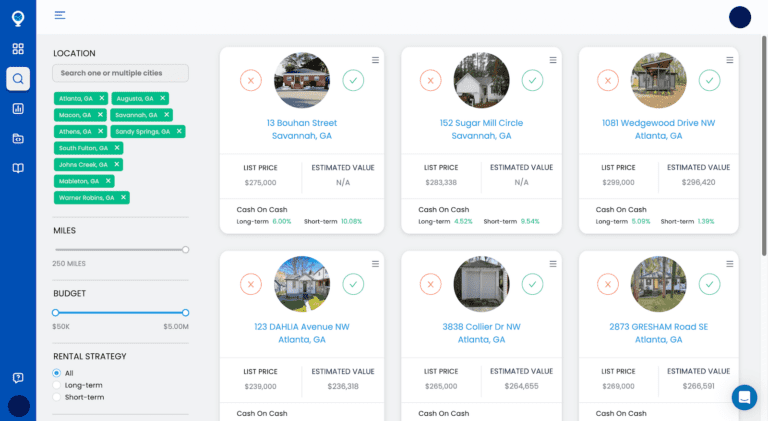
Just like any other real estate strategy, flipping contracts comes with important pros and cons, so investors need to make sure that’s the right approach for them before getting started.
Table of Contents
In this article, we’ll cover all the basics of flipping contracts in real estate. We’ll discuss what this means and why it’s a good approach for beginner investors. We’ll also touch on some drawbacks that you need to have in mind before getting into this practice. And lastly, we’ll provide you with a step-by-step guide on how to flip real estate contracts for maximum efficiency and benefit.
Throughout the article, we’ll show you how the Mashvisor platform can help you in the process.
Without further ado, let’s get started!
Flipping real estate contracts is a real estate strategy that means assigning contracts to transfer the ownership of a property from a seller to a buyer. This makes you an intermediary between a property seller and a property buyer who can be homeowners or real estate investors themselves.
This is very similar to wholesaling real estate , where you act as the wholesaler getting the property under contract and assigning the contract to the final buyer. You never get to own the house, so you don’t have to deal with buying and owning an investment property .
This is a short term real estate strategy that helps you make money quickly, without having to possess a property, pay property tax and home insurance, fix the property, maintain it, or manage it.
Although they sound similar, flipping contracts is very different from flipping houses. The main differences are that with the former, you don’t have to:
All the work that you do is related to finding properties, signing an agreement with the owner, marketing the property, and finding the most appropriate end buyer or homeowner. You need virtually no money to get started with this real estate strategy, as you don’t have to pay anything, not even a down payment. All the resources you need are for locating good sellers and good buyers.
The money that you make when you flip real estate contracts comes from the difference between the price of the contract and how much you manage to sell the property for.
In this sense, the main determinant of your real estate income from each deal is your negotiation skills, as you have to negotiate the terms with both the buyer and the seller. Another factor is how quickly you are able to close the contracts—the more deals that you close, the more money you will make from flipping contracts.
In order to boost your profit (the difference between what you make and what you spend), you also have to work on minimizing your expenses. This means that you have to use all possible resources for finding properties to put under contract and for finding buyers. Thus, building a list of possible property buyers that are able to buy fast and pay a good price is crucial.
To achieve this, many prefer to work with real estate investors rather than homeowners. Investors sometimes buy multiple rental properties for sale per year. They are also less picky about the properties—as long as the numbers from the rental property analysis make sense, they are willing to move forward with the purchase. That makes the process smoother and faster, meaning that you flip more contracts.
Depending on your expertise, qualities, and preferences, flipping real estate contracts can be a great way to make money from residential properties.
Let’s take a look at the most important benefits that this real estate strategy provides:
The main benefits that you will enjoy when you flip contracts include:
Despite all the benefits, there are certain drawbacks that come with flipping contracts in real estate. It’s important to be aware of them before you choose whether to dive into this approach.
Here are the main disadvantages to consider:
Now that you know the pros and cons of flipping real estate contracts, you can decide whether this is the right strategy for you. If you’d enjoy searching for properties, compiling lists of homeowners and buyers, and negotiating terms, you would most likely thrive and succeed in this real estate career .
Though the process of flipping contracts is not complex, it requires a lot of different kinds of hard work in order to succeed. However, things get much easier and more digestible if you break down the process in concrete steps.
So, here is how to flip real estate contracts step by step:
Real estate contract flipping begins with finding motivated sellers. These are homeowners or investors that need to sell their property quickly due to divorce, job transfer, or potential foreclosure.
You can find such properties:
To set yourself up for success, it is important to find properties that are distressed and sellers that are motivated. In this way, you will be able to put the house under contract at a low price, below market value. The lower the sales price, the higher your profit will be.
The Mashvisor real estate investment platform has a tool that can be particularly useful when you flip real estate contracts. This is the Mashvisor Property Finder . It’s an AI-based tool that helps you locate the most appropriate properties for sale for your exact needs, no matter what they are.
In brief, you can enter your criteria like the city or cities (up to 10), property type, and number of bedrooms and bathrooms to get a list of available matching homes. Most of these properties come from the MLS, while some are off-market properties that are ideal for this strategy.
You can like or dislike the proposed properties. The more you interact with the Property Finder, the more it learns about your preferences and the more suitable properties it is able to display. That’s where the AI part comes into play.
The Mashvisor Property Finder is a really great tool for real estate wholesalers who’d like to focus on working with investor property buyers.
First, the tool allows you to focus your search on properties that are specifically good for renting out on a long term or short term basis. Second, each property comes with a detailed investment property analysis , including things like rental income, cash flow, cap rate , cash on cash return, and occupancy rate.
This means that if you manage to put any of these properties under contract, assigning the contract to a landlord or an Airbnb host will be very easy.
To start finding the best properties to put under contract and sell to real estate investors, sign up for a 7-day free trial of Mashvisor.

Mashvisor’s Property Finder
Once you find a suitable income property, the next step is to contact the owner. When it comes to presenting yourself, there are two options:

The only way to make a profit with this real estate strategy is to put properties under contract for below-market value. To buy a home below market value, you need to know the market value first. If you ask the owner the lowest price they would accept and they quote a number that is $20,000 or more below market value, it shows that they are really motivated.
The best way to determine market value is to find out what similar properties nearby have been sold for in the past six months or less, known as real estate comps. You can get this information from a local real estate agent with experience in buying or selling property in the neighborhood or by using Mashvisor.
To get the most accurate market value data, you can use the Mashvisor investment property search engine. Use it to look for properties for sale that are located in the same neighborhood, are of the same type and size, and have similar features.
The listing price for these properties is a good estimate of the current market value in the area because the US housing market is a relatively neutral market as of this writing. This means that demand and supply are balanced, and neither sellers nor buyers have the upper hand. So, properties are sold for a price similar to the listing price.
When determining how much to offer on a house, you need to factor in the cost of repairs. It’s a good idea to bring a home inspector when visiting the property. Check out the roofing, plumbing, electrical wiring, heating and cooling, appliances, counters, cabinets, carpets, paint, or anything else that might need to be replaced or redone.
Once you have a rough estimate of the repair expenses, you can use these figures to justify your offer to the seller.
Your goal at this stage is to convince the owner to sell the home at the lowest price possible. When getting into negotiations, keep in mind the repair costs and what the property could sell for afterward. Here is a formula to consider:
Example: If the property is worth $200,000 after repairs, lower the figure to 70% ($140,000), and deduct the repair cost of $30,000 and your profit of $10,000, making the total $100,000 .
Once you have negotiated and agreed on a price, sign a contract that gives you at least 30 days to close a deal with the final buyer. For this step, it’s crucial to hire a real estate attorney that is experienced in flipping real estate contracts to guide you on how to put a house under contract.
It is important to have everything in writing and to be very clear on the exact rights and responsibilities of both the seller and the wholesaler. There should be absolutely no space for interpretation of what you can, should, or have to do.
Since the contract with the owner is expiring within a certain number of days, you will need to move fast to find a cash buyer. Indeed, it’s advisable to build your own list of potential buyers even before you start looking for properties to put under contract.
Here are some strategies for finding cash buyers:
Look for a title company that understands flipping contracts to handle the closing. Within a few days, the company will do a title search to find out if the property has any encumbrances or liens. The title company will also take charge of coordinating the sale, getting payment from your buyer, and drafting the final settlement.
After the buyer and seller have signed the wholesale real estate contract, the deed will be recorded, and you will get paid via wire transfer or check.
You can also watch our video to learn more about flipping houses step by step as a beginner investor:
Though flipping real estate contracts is an effective strategy for making money from properties, it is not for everyone. Before deciding to flip real estate contracts , ask yourself if you have:
For anyone willing to put in the work, flipping contracts can be a great strategy, especially for beginners who would like to try real estate and who don’t have ample financial resources. If you decide that this is the right choice for you, following the 8 steps outlined above will give you a competitive edge over other real estate professionals.
To find out how Mashvisor can help you find the best properties across the US market to put under contract or for other investment opportunities, sign up for a demo with our team.